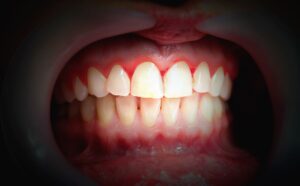Maintaining a healthy diet is vital for good overall health, but did you know that it also plays a critical role in the health of your gums? Gum disease is a common condition that affects millions of people worldwide. While the initial stages can be mild, the effects can worsen without treatment.
Although poor oral hygiene is one of the main causes of gum disease, research has also shown that vitamin deficiencies can increase your chances of developing the condition.

Important Vitamins for Oral Health
There are many vitamins and minerals that are crucial to your health.
Vitamin C
Vitamin C is one of the most crucial vitamins when it comes to gum health. This vitamin is necessary to produce collagen— a vital component of the gum tissue. Collagen helps to keep the gums firm and healthy, keeping them from becoming inflamed and infected. Vitamin C is also an antioxidant that helps to protect the gums from other damage. A vitamin C deficiency can lead to bleeding gums, a common sign of gum disease.
Vitamin D
Vitamin D is another essential vitamin that is necessary for gum health. This vitamin helps maintain the immune system. In turn, this helps to prevent inflammation in the gums. Inflammation is one of the primary causes of gum disease. Therefore, maintaining proper vitamin D levels is critical for preventing this condition. Vitamin D also increases calcium absorption, which is necessary for maintaining strong teeth and bones.
Vitamin B
Another vital vitamin for your gum health is the Vitamin B complex. This group includes vitamins B1, B2, B3, B5, B6, B9, and B12. These vitamins help to maintain the health of the oral tissues, including the gums. A deficiency in these vitamins can lead to many oral health problems, including gum disease.
Iron
Another important mineral is iron. Iron helps to maintain healthy red blood cells, which are responsible for carrying oxygen throughout the body. This oxygen is crucial for maintaining healthy gum tissue. This is because it helps to promote healing and prevent inflammation. An iron deficiency can lead to anemia. Unfortunately, this can lead to bleeding gums and other oral health problems.
In addition, a diet high in sugar and processed foods can also contribute to the risk of gum disease. Sugary and acidic foods can erode the enamel on your teeth, making them more susceptible to decay and gum disease. Processed foods are often high in preservatives and additives, leading to inflammation in the body—including the gums.
How to Prevent Gum Disease
To maintain good gum health, it is essential to maintain a well-balanced diet that is rich in vitamins and minerals. Eating a diet that is high in fruits and vegetables, lean proteins, and whole grains can help to provide your body with the nutrients it needs to keep your gums healthy.
If you are concerned about your diet or are experiencing symptoms of gum disease, it is essential to speak with your dentist. They can provide you with additional information about the connection between your diet and gum disease and can help you develop a plan to improve your oral health.
